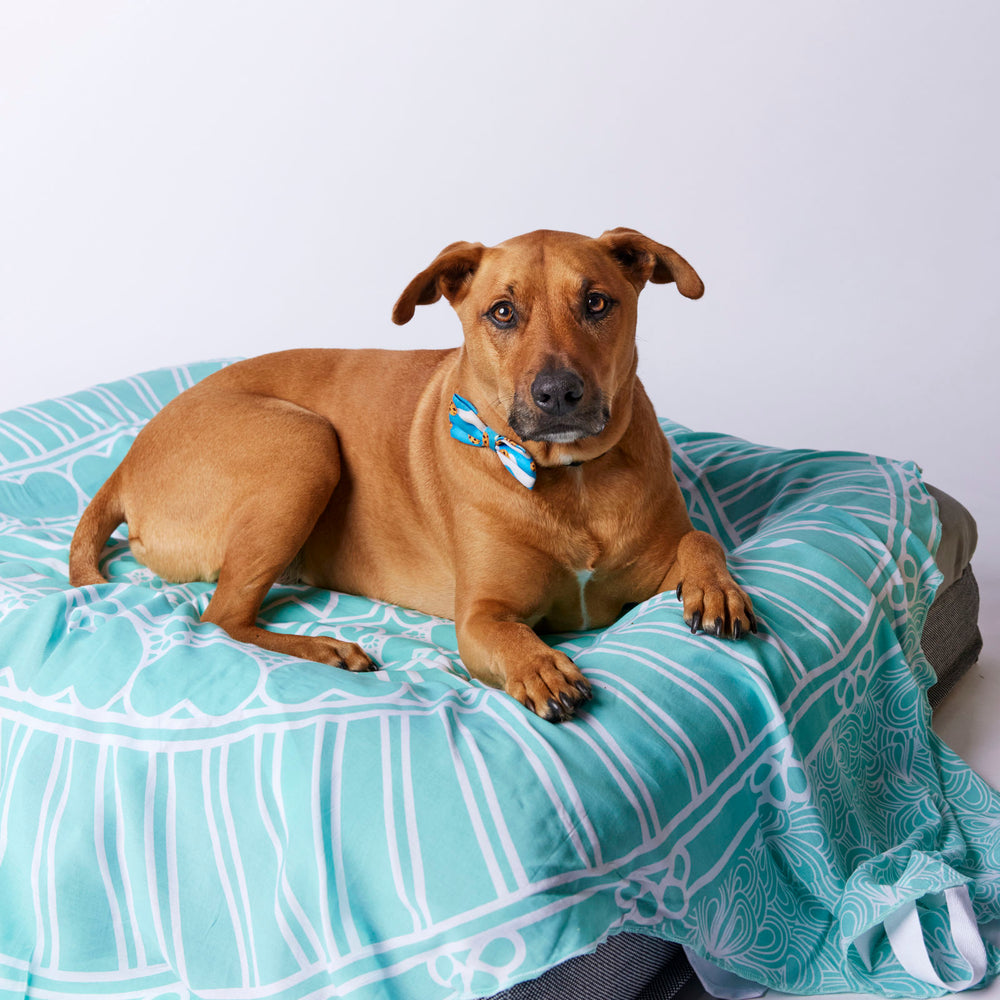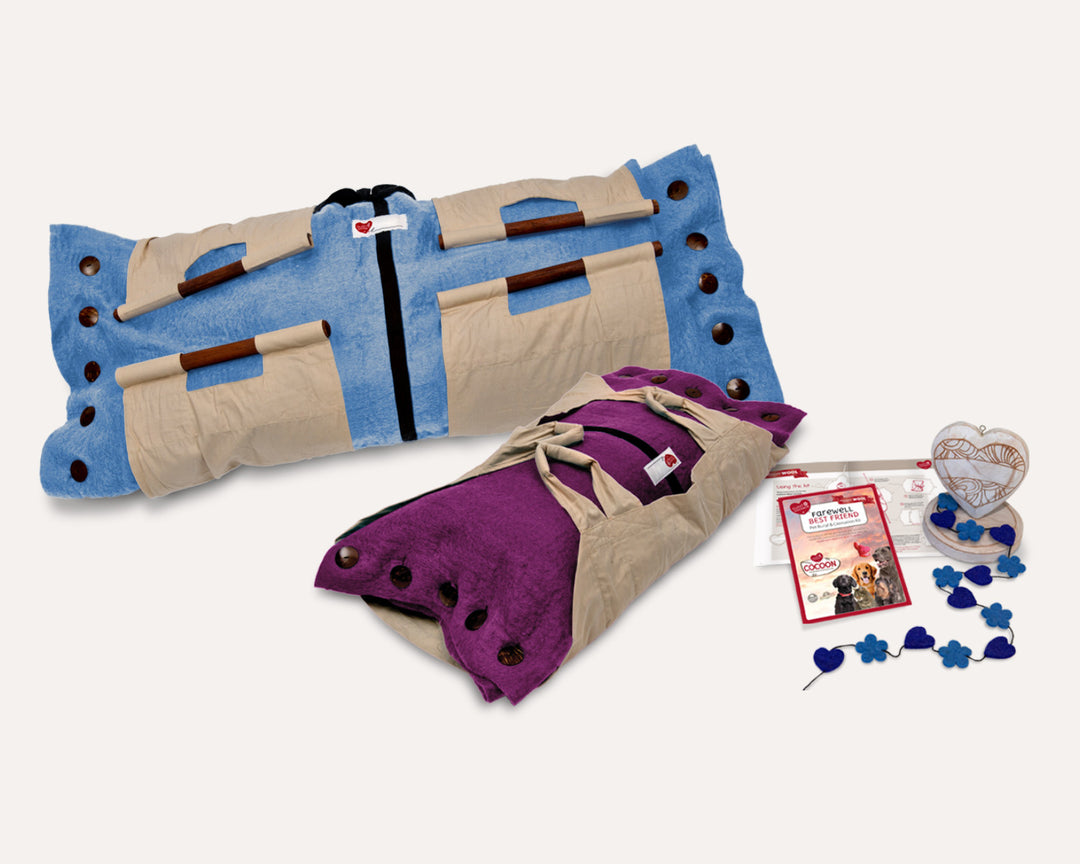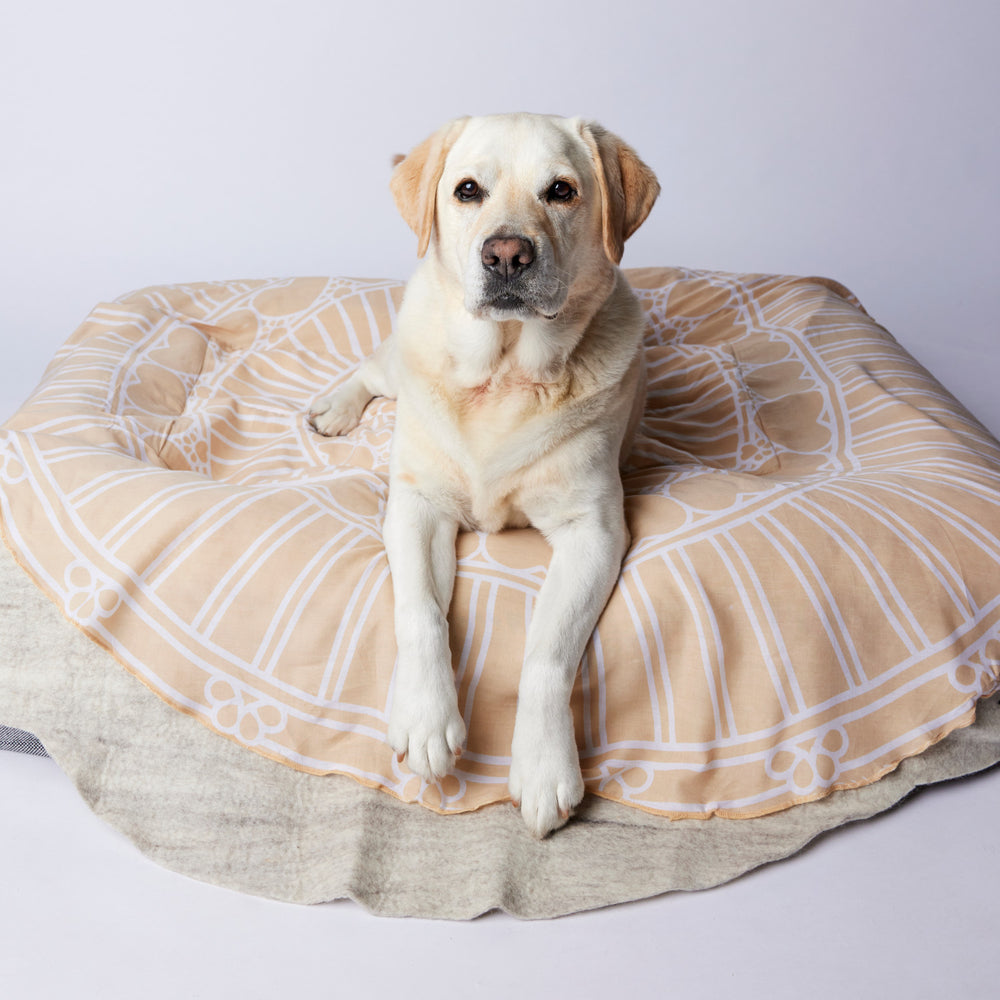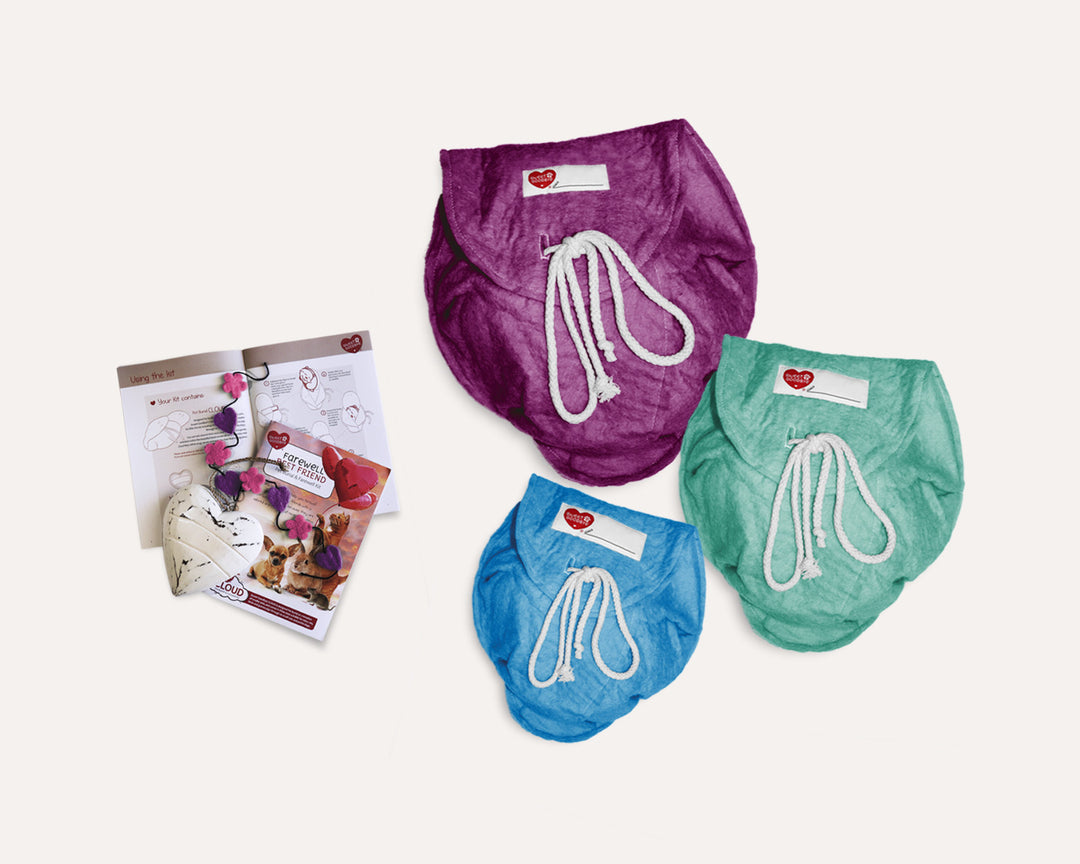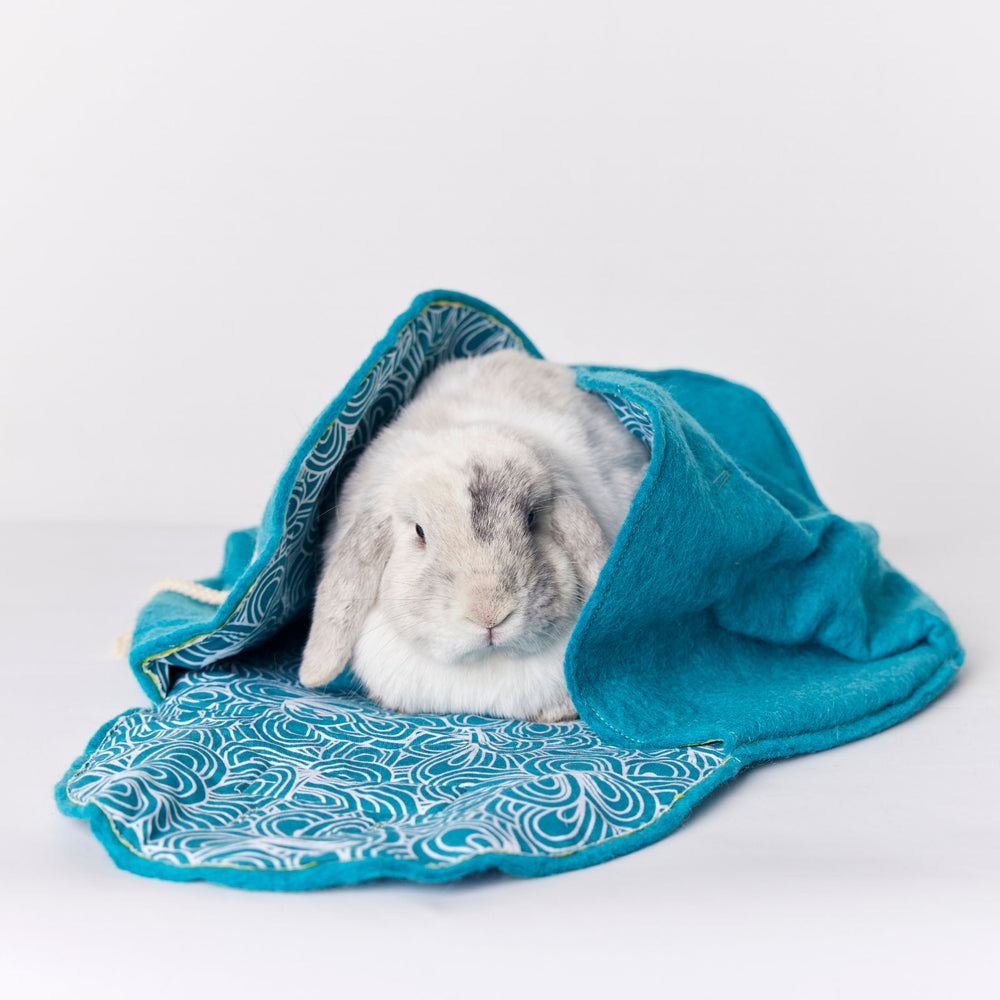Meet Mel and Amos: A Bond Forged Through Challenges, Love, and Last Goodbyes
Mel never considered herself a dog person - until Amos came into her life. What started as a practical decision during a tough season grew into a once-in-a-lifetime connection. In this moving interview, Mel opens up about her journey with Amos, the mischievous rescue dog who became her soul companion. From his bath mat thievery and creek swims to the quiet heartbreak of saying goodbye, Mel shares the raw, beautiful reality of loving and losing a dog who changed everything.

Tell us a little bit about Amos. What was he like? What made him your soul dog?
So I guess before we adopted Amos, I never really used to like dogs. I thought that was smelly and gross. So I ended up getting quite sick. And so I had to change a lot of my work situation, which meant I was home a lot more. And we thought maybe getting a dog to keep me company would be nice. And we checked the RSPCA website and that's when we saw Amos.
What attracted you to Amos and what made him become your soul dog?
Well, I guess because I'd never trained a dog before and never lived with a dog. So I guess just going from right at the beginning when I really had no idea what to do to spending time together and training and learning how to give him the best possible life that I could, which involved me learning to understand him and me learning how to train a dog. And that really helped with our bond. Amos was a very difficult first dog. It's nice to look at his social media and see this beautiful senior dog. I didn't start social media for the first two years of his life, because he was a nutcase. He was a very challenging dog. Actually I've been reflecting on that a lot more lately and just forget about all that stuff. So we've had to work through a lot of things and maybe it would've been easier if I'd had a dog before, but we've had to work through a lot, which I believe helped me. It's because of that journey together that made us so close.
What are some of your favourite memories together?
Well, not necessarily a favourite, but I was thinking before about how when I used to have a shower. Amos used to steal the bath mat from me and take it to our bedroom. And then when I used to hang the bath mat on the rack, he used to steal it. Yeah, funny. So he was a bit of a terror.

Was that something that was inherent from when you had him or was it something that developed over time?
Right from the beginning he was always a thief. He'd always steal our stuff. He would always steal our shoes and our underwear and our clothes and everything and pillows and that just kind of got always a thief. And he'd always be in the bins, ravaging through the bins, seeing what he could get. He stole food off the counter, all of that sort of stuff. But he was very underfed and skinny when we got him, and I don't think food was plentiful for him. So when he saw the opportunity to take food, he took it so that all calmed down. But a lot of the quirks started to come out as he got more energy and more food in him and all that sort of stuff. But he loved swimming, always loved swimming. He didn't know how to swim when we first got him though, so we had to teach him how to swim.
What was his favourite thing?
Swimming was probably his favourite thing. . And we used to love going down to the creek. It was quite funny. He hated going out in the rain but would quite happily go swim at the creek. Usually on a raining day I'd take us down to the creek and he'd play, and then as soon as he get home, he'd run back inside because he didn’t want to be outside in the wet. He loved that. He loved beach. We had some really lovely beach holidays.

What sort of things did you have to adapt as he got older so he could still enjoy his favourite things?
So I guess in terms of specifically swimming, we just cut the time down. He used to go spend an hour at the creek, so instead of an hour, we dropped it down to 15 to 20 minutes, but then sometimes even 10 to 15, just to give him his swims. We did also have a life jacket because he hurt his neck a couple of years ago, so we always had that as a backup option so he could keep enjoying his swimming and just have a life jacket. So he didn't have to work as hard. And I guess the early days he used to go swimming like four to five times a week. I would aim for once a week to try and get in there. So still doing that.
What about other activities?
We still kept taking him out on walks. Amos was never a walk once a day dog, he was quite reactive and stressed and anxious, so he didn't get big walks every day. We did a combination of different sorts of training things and we walked him for a bit less. But he still enjoyed going out for his walks. And even still this year he was still doing a three kilometre walk in the forest. I don’t how he did that.
Amos was losing his vision – why and what did you did to help him?
Amos had a genetic condition called progressive retinal atrophy, which meant that he was going to lose his vision, so he had damage to his retina and then some age-related changes on top of that and cataracts. It meant that he was basically blind, so there were obviously some adaptations for that. We made sure we didn't move any of our furniture when we moved things. I got him mats at the back door so he would know where the door was when he went to go out. He also had a little mat in front of his favourite chair so he knew where the chair was and put some slippery non-slip mats down on the corridor so he wouldn't slip. That was for age, but also for his vision as well, so he knew this was the corridor and this was the entrance into the room, the bedrooms and that sort of stuff. We also made sure we left our dog cameras on overnight as well.
I slept out in the living room, but I wanted to make sure that if there was a problem at night, I could see what it was and then make any changes. And we left lights on for him. I don’t how much vision he had, but we got into the habit of leaving lights on for him over the last year and a bit. I was also training him to wear goggles so that he wouldn't poke himself in the eye at the forest. We were also doing some confidence building, so stepping over different objects, stepping into balls, just so he would learn that even though he didn't have his vision, things still weren't scary and that he could still navigate his environment and that I was there to help him.
We were also working on access to the car, so we were starting to train ramps and also looking at a safer way for Amos to get on and off the bed because he unfortunately missed the bed a couple of times. He didn't know where it was, but it was just, he bounced back up, which was fine. So we were working on a step or a ramp, but we were delaying that as long as possible because he had his little routine where he came into the bedroom and would jump up on the bed and I was worried a ramp he'd run into. So I actually put a little rug in front of the bed to mark the middle of the bed so he knew where to stand to jump and that seemed to help.
When you first got the diagnosis for Amos, what went through your mind?
Well, I think one of the biggest things was that I always knew that he would die, but I like to tell myself that he didn't, that he wouldn't. So I think that was the big thing was that I was like, I know he's going to die at some point, but my husband and I thought he'd lived to 13 to 15 years. So we were like, we'll cross that when it comes. And so I guess suddenly in that moment you realise that he won't be here forever, which is so I basically just, I was like, I thought about our life over the last almost 10 years and what that meant without him in it. And I couldn't see a life without him. And it's still hard now.
When you made the call to say the last goodbye, what helped you with that decision? How did you know it was the right time and the right decision to make?
So I guess a couple of factors. One of the only symptom that Amos had, well the most obvious symptom was a cough. It was a really bad cough, and that's what was worrying us. So it actually helped that the night we were told what was going on, the cough was really bad and I was quite scared that we'd end up at the emergency vet. So the cough was a big tell. And actually we took him to the creek the next day. It was his favourite place and he was coughing and spluttering while he was swimming. And that was kind of the moment we went, we can't do this anymore. So it was the cough. And also he was breathing, his rate of breathing was really fast and he just looked just so lacking in energy and he just looked tired and done. But what also really helped was the emergency vets just going through it with us and showing us the scan because my husband and I were both physio, so we have a general understanding of anatomy, not we're not doctors, but showing us the scan and just basically showing us that the whole right side of the lung was full of cancer and they attempted to drain the fluid, but it was all blood.
So there was absolutely nothing that could be done. And time was very limited. So for them to sit there and explain it to us, we really felt like, right, there's no second opinions required here.
There's no good outcome here. This is the end. So we made the call to take him home so our family could say goodbye. But then our amazing vets actually had spoken to the specialist and then called me and my husband to ask to make sure we understood what was going on and just went through it again for us to help us realise that it was the time and probably sooner rather than later. I'm really glad we got Friday night, but I'm really glad things didn't escalate on Friday night and we were at the emergency vet because it meant that we could get up, take him to the creek. We still weren't sure at that time what was happening, but like I said, the coughing, it was really bad and he's just been such an amazing dog and we couldn't let him suffer and struggle. So we made the call.

Looking back, was there anything that you're really grateful that you did with him in those last few weeks that I suppose made that last time special?
I think I just did everything I could for him. So I don't actually have any regrets about anything. And the only thing that would've been nice is that I had wanted to take him to the beach this year. And so I didn't get that opportunity because I never took Amos to the beach on school holidays because it was just too busy and he was too reactive and he didn't enjoy it. So we were waiting for that. And then he had surgery three weeks before we found out to have some lumps removed. He managed the surgery amazing. His bloods were perfect, everything, everything was going well. And then I couldn't take him to the beach. He was recovering from surgery and then the cough and the vet. So I wish I could have taken him this year, but as to what more I could have done, I did everything I could for him and I feel really happy with that. I always made sure we were going for adventures and taking him swimming in the creek and training. So yes, in the last few weeks it would've been nice to do a little bit more swimming, but he was, like I said, he had lumps removed so I couldn't get the bandages wet and no one had any idea at the time.
Were there any small comforts or rituals that you did that day or that you've done since Amos's passing that have helped you and the family to grieve?
Yeah, but like I said, I feel it was really good that we got to say goodbye. So my parents came over to say goodbye to Amos. My sister and my niece all got to say goodbye to Amos. So that was really nice and special for me and I know for them. And then we got to say goodbye as well. So it kind of helped, not close it, but it kind of helped going forwards. And then something I've also done is a lot of journaling. I wrote a thank you letter to Amos. It was like six or seven pages or something, but just a nice thank you letter to say thank you for everything he did for me and being such an amazing dog. And it was just nice to write that down. And then I also did was I sat down and journaled and just reflected on what happened because it was a Thursday night afternoon, I took him to the vet and then that's when we found out something was wrong.
And then it was just a, between Thursday, four o'clock and Saturday midday, it was such a whirlwind that all I was in that time, all I was thinking about was Amos and just making sure he was happy. So I just spent time sitting down and reflecting on what had happened and how it made me feel and what it meant to be, and just to make sure there wasn't anything that I hadn't need to speak to anyone to resolve it or anything. So that was really helpful. And I also, I bought a book which was really useful pet loss book, so I actually really enjoyed that book. I've only just finished it and was just reading a little bit at a time, which was quite nice. We also got a moss cremated, so that was really nice to kind of have him come home. And then we got a little mould done of his nose, which was nice.
So we've got those memorabilia. And I very quickly on that, I'd bought a thing to do my own paw print and nose print. It had been my plan to do that this year. So we very quickly did it on Friday night, quickly grabbed his pore and his nose print. And I also managed to get some clay olds taken. I'm going to get some jewellery of him. Yeah, that's beautiful. And then, yeah, just putting, I've still got a lot of his stuff around. I need to make a memory keepsake box, but it's all just kind of around at the moment. And then I think also social media posting on social media has helped and just saying how I feel and everything,
What does grief look like for you now?
I think probably now it will come in waves. So I'll be totally fine during that and I'll think of him and I'll be totally fine, and then I'll just randomly think of something and then burst into tears and it'll be something little, I'll think about a moment together. And sometimes it's just a little tear and I'm like, oh, that was really nice. Or sometimes I just completely burst into tears and I think I still forget that he's not coming home. I think it's nine weeks this Saturday, so I sometimes forget, but it's definitely not like, sorry, I function and I go to work and I like to talk about him. A lot of the girls I work with, we talk about him and I can share stories about him. And yeah, other times I just think, and then I miss him and then I just cry.
On your social media we saw what Amos was like as he grew older – what is the the content going to look like now?
Well, I guess, and early on I was posting a lot about grief and how I was feeling because I think I know, especially with the senior dog, I never really liked to look at those posts that people were posting because again, I was like, my dog's not dying. He will be here forever. So I didn't really want to look at those posts. But then when it happened, I actually noticed that I was looking at other people's posts and I actually really helping me. And I was like, well, I feel like number one, I need to do those sort of posts early on to help me. But also there might be someone else who opened up their social media and is feeling how I feel and they see my post and it makes them feel a little bit happier. But I think the biggest thing for me that I never really realised is just the emptiness and the quietness and the silence. And that was probably the hardest part when I came home. There was no one to greet me.
Three o'clock would come and he wouldn't bark at me to tell me I had to play. It is those little things that you don't really think about waking up in the morning. I don't have to make his breakfast, which is weird. And I think maybe if I'd thought about some of those things before, maybe I just would've been a little bit more aware. But that's probably the hardest part is the lack of routine and the emptiness and the quietness. So I'd started posting a lot about that. That was how I was feeling. And then also sharing, I've also got a whole load of videos that I had planned to make, and then I just ran out time. So there's a few that I've got on my list and I'm like, I just want to make them. I wanted to make them. And then sharing some of my old favourite videos and then things like things I miss my dog doing similar style to how I did, just changing a bit of the wording.
If you were to give advice to someone who's preparing to say goodbye to their dog, what advice would you share?
I think I would, I know that I told Amos that I loved him. I absolutely 100% know that he knew that I loved him and I did everything I could. So I would really encourage people to just tell your dog you love them, make sure they know. I told him I loved him every single day and all he knew was love. And I feel really happy and grateful about that. If there is something you wanted to do with them, I would do it. Like I said, the only regret is not taking him to the beach, but really at the end of the day, that's not a big thing. But I have no regrets because I did everything that I possibly could to give him the best life that he had. I couldn't have done any more. And I feel even when I was reflecting, I felt good with that. I was like, I did everything I could. He had a great, amazing life. So I think if you can be at this point and go, I told him I loved him. I did everything I could for him. And then if there's something you want to do, I would do it.
Like I said, I found reading a pet loss book really good and I didn't have time, but if you know the time's coming, it might be nice to do a bit more reading into how you're going to manage that time. I don't know if I knew that Amos had a couple of months, maybe if I started to read something about that to help me through that process, it might've been better. I know I'd still need to go through it again. But there are a few things in there about preparing for the moment that was good. And I guess talking to people in similar situations, like I said, our vets, we have a good relationship with our vets and they're amazing, and talking to them was really useful. So even if you've got a good vet, talk to them about things. And
Some people who lose their pets end up getting another pet to help them move on - what would you say to people considering doing that?
So it is weird because like I said, Amos was going to be a mortal, so I really had to snap out of that. So I always thought that I wouldn't get a dog for another year. I truly thought that I had no intention of a dog at all. But like I said, when he left the silence and the emptiness was just like, I hated it. And I actually said to my husband, I was like, I don’t know how long I can do this for. I need routine. I gave Amos a lot of love, and I feel like I have a lot of love to give. And I just feel like that it wasn't going anyway. And I was becoming a bit of a miserable person as well. I was seeing dogs and I didn't want to look at them. And I was like, I don't want to look at a dog.
So I chose to go out to our local shelter, RSPCA, where we got Amos from and just spent the afternoon with dogs. I didn't want to go, I cried in the car when I got there and I did not want to go. But I would really encourage anyone, if you're struggling after losing your pet to go to the shelter. I mean, my friends have dogs, but they're in a loving home, being well taken care of. I wanted to go and spend some time with dogs that were at a shelter and just needed love. And I spent an hour and a bit with the volunteer, and I took the dogs for a walk, and I felt so much better after. And then the RSPCA called me the next day and they asked me if I wanted to foster a dog for the weekend just to keep me company.
And I was really reluctant and I didn't want to do it, but I did it and I was adamant. I said to my husband, she's not staying. And then I had a big meltdown in the shower because she wasn't Amos and she was being a wild puppy. And my beautiful senior, 11 and a half year old dog would've been chilling by now, and I just wanted her to go. So anyway, we had a nice weekend together, sent her back on the Monday, and I was like, it's fine. I mean, I cried when she left! But I had decided that it was just nice having the company so we decided we’d foster her.
My plan was to just keep fostering her for the next six months and not have to make a difficult decision. But anyway, long story short, we got asked to bring her back as they had someone who wanted to meet her to adopt her, and we decided that we couldn't send her back - it was a really hard decision because again, Amos is my first dog, so I've never had to get the second dog before. When we first got Amos, we were like, he looks good, let's give it a try. And this was different because we were going for the second dog. How do I know if she's the right dog? How do I know if Amos sent her for me? Everyone's telling me to look out for these signs.
I think once you've gone through pet loss before you know what you’re signing up for and you know what happens at the end. Whereas I was pretending that wasn't going to happen with Amos, whereas I know what's happening here. Are we ready to sign up for this commitment? And the only thing that was holding us back was she wasn't Amos. And so then obviously I can't get him back. So that was a hard, well, not hard, I just had to go, this just how it is. He's not coming back. This dog is beautiful. There's nothing wrong with her. So we chose to adopt her.

Amos was a rescue dog, why did you choose to get a rescue?
We just want to help rescue dogs. And that was my husband's English. We were living in England and they had a lovely border collie there, and that was from a breeder. But when we moved back to Australia, we just went, we're going to rescue a dog. And that's just what we wanted to do. I don't remember, my husband was leading most of that and he actually found Amos, and I don't think there was ever a question. I think we were just aware of how many dogs there are in shelters, and we just went, we just want to rescue a dog. And also, I mean, like I said, Amos was a difficult dog. They're all going to have different backgrounds, but it is such a rewarding experience. And I think from that, I know people can get some really challenging rescue dogs and it's tough, but I think our decision was we will always just rescue dogs. So thanks to Amos, we'll always just continue to rescue dogs.
A huge thank you to Mel for being so honest and open after such a difficult time. If you want to learn more about Amos and Mel's journey of healing you can follow her here: https://www.instagram.com/amospearce/





